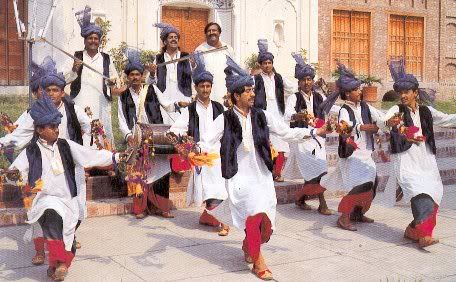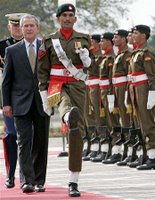
George W. Bush’s recent trip to South Asia exposed some harsh truths that Islamabad is now desperately trying to fudge over.
In today’s Dawn the columnist Irfan Husain does a good job of dissecting reality from the spin.
______________________________________________
A tale of two countries By Irfan Husain
IN the recent parliamentary debate on foreign policy, speaker after speaker lambasted the government, comparing the far-reaching nuclear deal with India announced by President Bush in New Delhi with his homilies in Islamabad.According to General Musharaf’s critics — a rapidly multiplying tribe — this imbalance is a reflection of Pakistan’s failed foreign policy. Although official spokesmen tried to put their usual spin on this obvious reality, the truth is that Bush’s priorities during his visit ought to have served as a reminder of the changing equation in the subcontinent.
Khurshid Kasuri, our foreign minister who normally weighs his words, termed the American tilt towards India as “unacceptable”. Excuse me? I don’t recall either Washington or New Delhi seeking our “acceptance” of a bilateral deal. Even General Jehangir Karamat, our ambassador in Washington, thought he should lecture his host country on the subject. He was quoted in this newspaper as saying:
“Instead of a country-specific deal on a subject as critical as nuclear technology, there should be a package for both India and Pakistan.” The thread running through the statements of various official spokesmen seems to reflect a common Pakistani perception that somehow, Washington should treat India and Pakistan as equals.
The problem is that reality dictates otherwise. By any measure, India has emerged as a major player on the global scene. Pakistan, on the other hand, has moved in the opposite direction, descending into sectarian and ethnic strife, and seen to be harbouring gangs of terrorists on its soil. Granted, 9/11 has boosted its economy as well as its standing as a strategic ally in the American ‘war on terror’. But remove the ‘9/11 factor’, and we are left with a dysfunctional state in terminal decline.
These are harsh, unpalatable truths that are difficult for Pakistanis to accept. But unless we face reality unflinchingly, we will be unable to understand why the rest of the world views us as it does. Equally importantly, we need to see Indias rise not in relation to Pakistan, but as an important regional and global event in its own right.
For much of the half century after its independence, the Indian economy grew slowly, stifled by red tape and over- centralization. By contrast, the Pakistani economy grew more rapidly, propelled by a greater commitment to the free market. But in the nineties, the picture changed: plagued with political instability and military interventions, the Pakistani economy went into a sharp decline while terrorism destabilised the entire system.
India, on the other hand, freed from some of its self-imposed shackles, began making rapid progress. Its large pool of well- educated computer personnel drove Indian information technology to the centre of the world economy, apart from moving to American firms in large numbers. A rising middle class provided the market for a consumer boom, and now, Indian entrepreneurs are competing for business around the world. Bollywood movies are hits abroad, and Indian fashions are seen on catwalks from Milan to Madrid.
Currently in London, a trial of seven young men on terrorism charges is making headlines across Britain. Six of the seven are of Pakistani origin, and are alleged to have received training in bomb making in Pakistan. The prosecution has produced a staggering amount of evidence, so whatever the outcome of the case, it will not be ideal publicity for Pakistan. Similarly, most of the suicide bombers involved in the terror attacks in London last July were of Pakistani origin.
At a conference on Pakistan organised by the Economist in London last month, several speakers, both Pakistani and British, dwelt on the investment opportunities available, as well as the liberal government policies. But the elephant in the hall everybody skirted around was the appalling security problems. One British chief executive of an energy firm operating in Pakistan did speak about the need to hire security guards, and mentioned the recent killing of three Chinese engineers in Balochistan. But the Pakistani speakers did not discuss the issue, perhaps because they are so accustomed to the situation.
The real bottom line here is that for investors, the physical security of their employees is even more important than profits. When extremist mobs torch outlets of western fast food chains, for example, images of the burning buildings flash across the globe in a matter of minutes. The most recognisable image of Pakistan abroad is now one of angry eyes, long beards, and men armed with Kalashnikov rifles.
Musharraf has often boasted of Pakistan’s credentials as a key ally in the ‘war on terror’ by pointing to the large number of Al-Qaeda suspects killed or captured on our soil. But the question to ask — and one asked frequently abroad — is what they were doing in Pakistan in the first place. In investigations into Islamic terrorism across the world, the Pakistan connection has cropped up time and again.
In the nuclear context, we forget just how much damage Dr A.Q. Khan’s supposedly freelance activities have done to Pakistan’s image. If he acted on his own, it is a poor reflection on the control exercised over our nuclear installations by the army. The other (and stronger) possibility is that he was officially encouraged to export atomic secrets to foreign buyers. In either case, to imagine that the Americans would now supply us with the latest nuclear technology is to live in a fool’s paradise.
So when we ask to be treated at par with India, foreigners may make polite noises, but everybody knows where the reality lies. Had it not been for 9/11 and the ongoing western operations in Afghanistan, Pakistan would have been relegated to the backwaters of the world, together with Myanmar, Somalia and Rwanda.
We dug ourselves into this hole, and we can climb out of it, provided we accept the fact that we are in a hole. The first obvious step is to understand that there is no place in today’s world for state-sponsored or even state-tolerated terrorism. The presence of thousands of armed men loosely organised under various fundamentalist and ethnic banners is unacceptable to the rest of the world, and should be unacceptable to us.
Musharraf must realise that words are not enough to combat this plague of mindless violence. His litany of ‘enlightened moderation’ must be matched with action, something that has long been missing from his agenda. What is needed is a sustained, consistent campaign. But political will is required, and for this, a consensus has to be built up.
Unfortunately, our current military dispensation has been just as divisive as the previous ones were. Now, even when he makes eminently sensible proposals, they are rejected by a fractious opposition that no longer trusts Musharraf.
Far from providing a solution, he has now become a part of the problem.
_____________________________________
Pakistan
Irfan Husain














